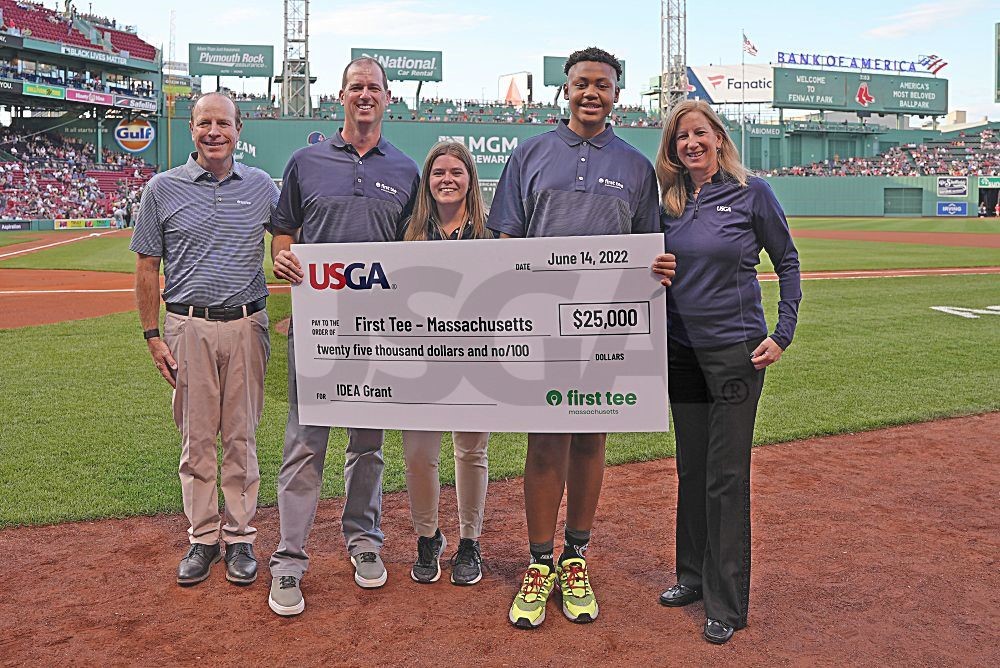First Tee Chapters provide inclusive golf and character building programs for all kids and teens
By Megan Hart, First Tee HQ
About a quarter of Americans have a disability, according to the Centers for Disease Control and Prevention, but as many organizations have redoubled their focus on diversity, equity and inclusion in recent years, this group can often go overlooked in discussions on the topic.

For 25 years, First Tee has shown up every day, determined to ensure that every kid and teen feel welcome and included. First Tee – Greater Cincinnati & Northern Kentucky is just one example of our Chapters who promote inclusive programs.
The Chapter partners with organizations like Els for Autism, Special Olympics of Hamilton County and SCRATCHgolf to serve players of all abilities and skill levels, proving golf is for everyone.
Thanks in part to the United States Golf Association’s IDEA Grant, the chapter has been able to expand its opportunities for all kids. The IDEA Grant was created to promote inclusion, diversity, equity and accessibility efforts at the local golf level. This grant program awarded $200,000 from USGA to First Tee Chapters across the country in 2021.
“USGA’s support is a game changer for the youth in the communities that we serve,” said Greg McLaughlin, First Tee CEO. “With these grants, our chapters are opening the door to even more youth, especially in underserved and underrepresented communities, to explore the possibilities in golf and beyond as they build their character and life lessons through the game.”
The USGA’s efforts to make golf more inclusive go far beyond its work with First Tee. The association will host the inaugural U.S. Adaptive Open at Pinehurst this July, which will feature the globe’s top golfers with disabilities, including those with limb impairments, intellectual and neurological impairments and seated golfers. Among the field is First Tee — Tampa Bay alum Joey Hill and First Tee — Triangle alum Zachary Duncan!
‘You just have to love the kids and find out what they need’
First Tee – Greater Cincinnati & Northern Kentucky is focused on reaching children from all backgrounds and abilities, and with the help of the USGA and other organizations, they have found creative ways to become more accessible.
The Chapter will bring back programming for kids with autism this fall after it was put on hold by the COVID-19 pandemic. Staff first trained with Els for Autism in 2018.
Greater Cincinnati & Northern Kentucky also partners with Special Olympics of Hamilton County to introduce participants to golf. The program attracted about 20 kids per year before the pandemic, and it’ll return this summer for a weekly series.
Three kids have transitioned from the Chapter’s Special Olympics program to its golf course program, and Executive Director Alicia Yund recalls seeing a Special Olympics participant return for a community field day hosted by the chapter.
“It was cool to see him thriving and see how all the other kids were in awe of him and his ability to hit the ball,” she said. “It’s great when all kids are included.”
Wendy Mockabee manages the School Program at First Tee – Greater Cincinnati & Northern Kentucky, which integrates First Tee’s life skills program into elementary and middle schools in the community. One of the participating schools exclusively serves special needs students, and it’s been inspiring to see how teachers have adapted First Tee programming to meet the needs of the kids. For example, teachers attached a leaf blower to a golf club so children with mobility challenges could instead push a button to move the ball.
In addition, the chapter hosts programming for kids with life-threatening and chronic health challenges, including SCRATCHgolf. In partnership with Cincinnati Children’s Heart Institute and the Congenital Heart Alliance of Cincinnati, the chapter recently held a multiday camp for kids with heart defects, who are then provided scholarships for future programming.
“We’ve been very focused on making sure all kids have a safe space, an environment where we’re prepared to make any modifications necessary to make them feel welcome and part of First Tee community,” Yund said. “Weaving accessibility and inclusion into programming — outside of finding more volunteers — it’s not a daunting or taxing effort. You just need to love the kids and find out what they need.”
A number of First Tee chapters within the network offer youth development and programming for participants with disabilities. Contact your local chapter to learn more.
